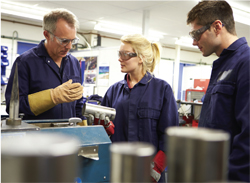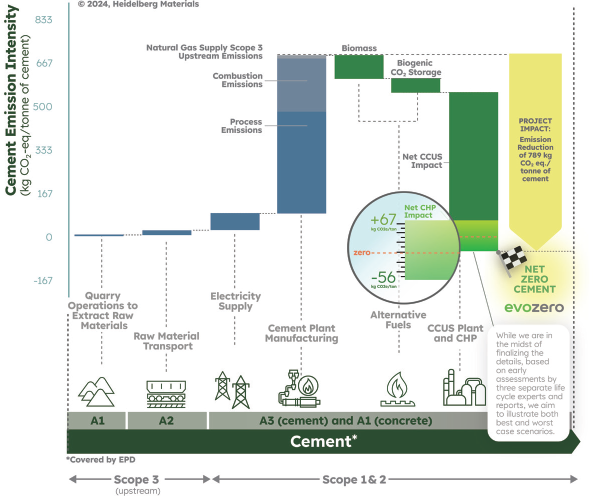October 2014
COMMUNITIES: INDUSTRY
Universities Respond to Demand for Manufacturing Focus in Engineering
American universities are seeing a strong demand for increased focus on advanced manufacturing in their engineering schools—from industry, government, and even their students.
“Students are a big push behind this,” says Marc Rigas, director of research initiatives at the University of Pennsylvania. “Students, especially in the engineering school, are very interested in these tools that allow them to make things easily. I think students are interested in that, and they’ve been a big driver behind it.”
The challenge for engineering schools is to provide students a balanced education that is not hyperfocused on one aspect of engineering or manufacturing. “Most employers, when they hire our students, it isn’t because of a programming language or an engineering skill, but it’s [because of] the ability to think through problems and to apply higher-level thinking and higher-level processing to the problems that those companies are facing,” says Steven Devlin, assistant dean of entrepreneurship and director of the Extension Business Development Program at the University of Missouri’s college of engineering.
Despite the challenge, many universities are responding to the demand from students, as well as industry and government. The University of South Carolina, for example, opened the McNAIR Center for Aerospace Innovation and Research just last year, and in July of this year the center unveiled plans for a new facility that will feature top-of-the-line manufacturing equipment used in aerospace manufacturing, specialized laboratory space, and general-use work areas designed to foster collaboration.
The University of Pennsylvania, the University of Missouri, and the University of South Carolina have also all endorsed the recently proposed Manufacturing Universities Act of 2014, a bipartisan bill introduced by US Senators Lindsey Graham (R-SC) and Chris Coons (D-DE). The bill would designate 25 universities “manufacturing universities,” providing a financial incentive to better align educational offerings with the needs of modern manufacturers. Designated schools would receive $5 million per year for four years to focus engineering programs on manufacturing, build new partnerships with manufacturing firms, grow training opportunities, and foster manufacturing entrepreneurship.
“It’s critical that our schools and universities equip students for success in manufacturing and contribute to the research and development that drives advanced manufacturing,” Coons says. “Although our economy has created more than half a million manufacturing jobs over the last three years, hundreds of thousands remain unfilled because we don’t have enough trained workers. We need our engineers to fill the growing demand for manufacturing workers and accelerate manufacturing’s growth. This bipartisan bill would help us meet that challenge. By helping schools focus their engineering programs on advanced manufacturing skills, we can equip our next generation of engineers with the skills they need to thrive in the 21st century.”
 “This is a natural thing for us to be associated with,” says Tony Ambler, USC’s dean of engineering and computing. “We’re all about vigorous teaching and research that brings direct benefits to the state of South Carolina and the United States. We are here to support that mission.”
“This is a natural thing for us to be associated with,” says Tony Ambler, USC’s dean of engineering and computing. “We’re all about vigorous teaching and research that brings direct benefits to the state of South Carolina and the United States. We are here to support that mission.”
Other universities and manufacturers have also endorsed the bill. Karen Fletcher, vice president of DuPont Engineering, Facilities Services & Real Estate and chief engineer, says the bill will promote R&D and innovation and keep American manufacturing competitive. It will also provide the company with the talent it needs, “from associates who operate our plants to engineers who participate in the discovery process, provide technical expertise, and execute our capital projects.”
At the University of Pennsylvania, Rigas emphasizes the importance advancing knowledge and discovery for the good of society. “In addition to just doing the basic research—the knowledge, and the discovery we do at the university—we really focus on commercialization of that research for public good, and we do that through the marketplace.”
Ambler adds: “This does not take us away from what universities are traditionally thought of as doing, which is research. This still does basic research. We’re just putting it together in different ways.”


 Volunteering at NSPE is a great opportunity to grow your professional network and connect with other leaders in the field.
Volunteering at NSPE is a great opportunity to grow your professional network and connect with other leaders in the field. The National Society of Professional Engineers (NSPE) encourages you to explore the resources to cast your vote on election day:
The National Society of Professional Engineers (NSPE) encourages you to explore the resources to cast your vote on election day: AMBLER
AMBLER COONS
COONS RIGAS
RIGAS


